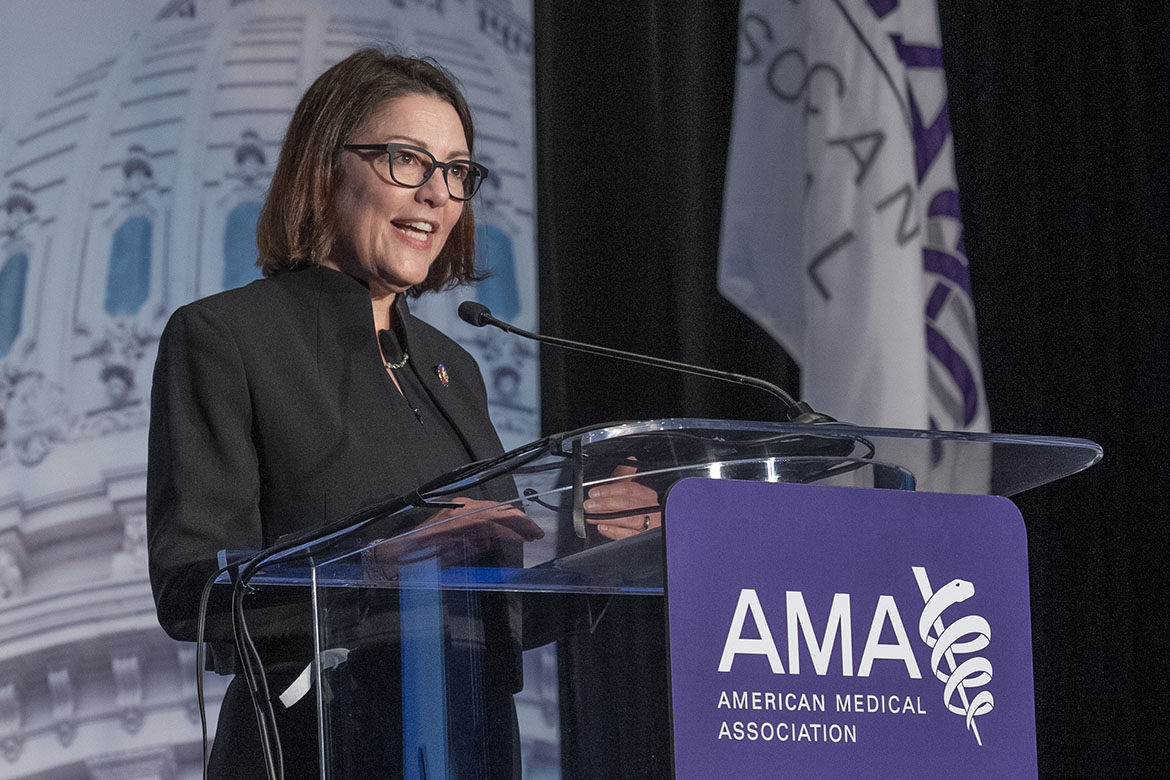AMA-supported bipartisan legislation that provides relief from prior authorization-related health insurance headaches to more than 28 million seniors and the physicians who care for them was passed by a unanimous voice vote in the U.S. House of Representatives.
The “Improving Seniors' Access to Care Act” (H.R. 3173) garnered 326 co-sponsors and now goes to the Senate, where it already has secured 43 co-sponsors.
“Now that the House has passed this legislation, we urge the Senate to do likewise,” said AMA President Jack Resneck Jr., MD.
“There is a Senate companion bill that also has bipartisan support,” added Dr. Resneck, professor and vice chair of the University of California, San Francisco, School of Medicine’s dermatology department. “While health care legislation often divides Congress, here is a bipartisan way to improve patient health.”
Bill incorporates agreed-to reforms
Specifically, the legislation would:
- Require Medicare Advantage plans—through which 28 million U.S. seniors get care—to implement electronic prior-authorization programs that adhere to new federal standards), as well as establish real-time decision-making processes for items and services that are routinely approved.
- Enhance transparency by requiring Medicare Advantage plans report to the Centers for Medicare and Medicaid Services on the extent of their use of prior authorization and the rate of approvals and denials.
- Require plans to adopt transparent prior-authorization programs that disclose to physicians and beneficiaries the services requiring approval and the underlying policies and criteria.
- Permit MA plans to institute gold carding provisions.
- Mandate that Medicare Advantage plans issue accelerated prior authorization decisions for all services in Medicare Part C.
Prior authorization is a health plan utilization-management or cost-control process that requires physicians to get approval before a prescribed treatment, test or medical service qualifies for payment.
“The House recognized that prior authorization is an insurance companies’ practice that is overused, costly, opaque, burdensome to physicians and harmful to patients due to delays in care,” Dr. Resneck said. “The American Medical Association is committed to fixing prior authorization and made doing so a central plank of our Recovery Plan for America’s Physicians.”
The bill’s sponsor, Rep. Suzan DelBene, D-Wash., told the 500 physicians and medical society executives attending the 2020 AMA National Advocacy Conference that her bill’s provisions stem from the consensus statement on improving prior authorization that was developed by the AMA, other health care professional associations and payer trade organizations.
In the four and a half years since health insurance representatives agreed to the measures listed in the consensus statement, few reforms have been implemented.
Like thousands of other Americans, DelBene knows someone negatively affected by prior authorization. In an interview with the AMA, she discussed how the process delayed surgeries for two of her relatives.
Similarly, AMA Immediate Past President Gerald E. Harmon, MD, a family physician in South Carolina, also shared on a recent AMA Moving Medicine episode his story of how prior authorization delays threatened to disrupt his 92-year-old mother’s regimen of generic medications that she had been taking for nearly a decade.
AMA advocacy, research recognized
Prior to the vote, DelBene spoke on the House floor and cited AMA research and noted how AMA advocacy helped advance her bill.
“According to the American Medical Association, one out of every four physicians report that prior authorization has led to a patient being hospitalized,” she said, adding that physicians spend 13 hours a week on prior authorization paperwork.
“That’s time they could be spending with patients,” DelBene said.
She called the bill a “bipartisan success story,” and thanked its co-sponsors, including Rep. Mike Kelly, R-Pa.; and physician legislators Reps. Ami Bera, MD, D-Calif.; and Larry Bucshon, MD, R-Ind.; as well as Sen. Roger Marshall, MD, R-Kan., who previously worked on the bill in the House and is now sponsoring the Senate version.
“I want to particularly thank the Regulatory Relief Coalition and the American Medical Association (PDF) that helped develop a quality bill and build support for it,” DelBene said, adding that the bill was supported by more than 500 health care organizations (PDF).
Advocacy work continues
“This is the most supported health care bill in the entire Congress both in the number of co-sponsors and the weight of more than 500 national and state endorsing organizations,” Dr. Marshall said in a news release.
Physicians and patients can visit fixpriorauth.org for additional information on the “Improving Seniors’ Timely Access to Care Act” and the AMA’s efforts to reform prior authorization.




